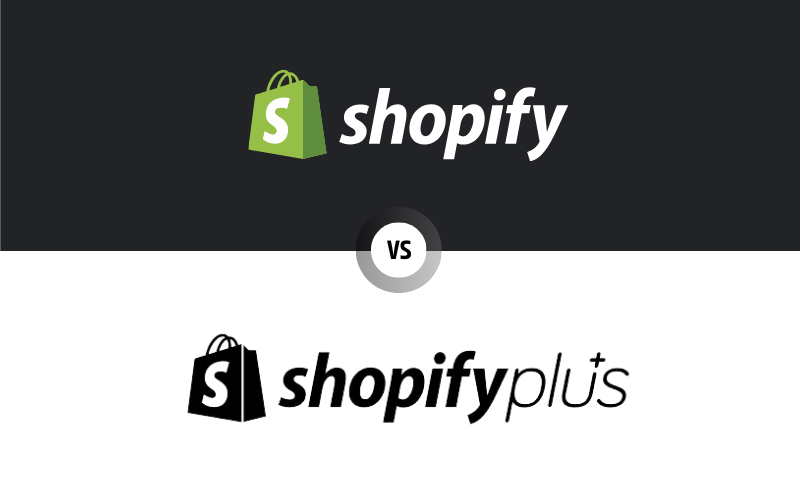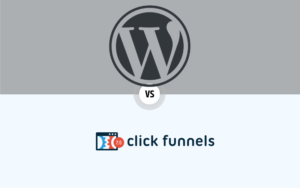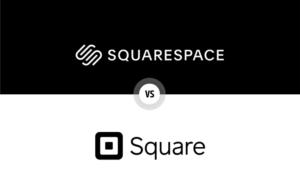In the dynamic world of e-commerce, having a robust and versatile platform is crucial for the success of any online business. Shopify, a leading e-commerce solution, has been at the forefront of providing businesses with the tools and features necessary to create, manage, and scale their online stores effectively. As you consider launching or growing your online presence, understanding the capabilities of Shopify and Shopify Plus becomes essential.
Shopify’s platform is designed to cater to businesses of all sizes. It simplifies the online selling process with an intuitive interface, easy-to-use tools, and a comprehensive set of features that can be adapted to a wide range of industries and business models. From product management to payment processing and everything in between, Shopify provides a one-stop solution for merchants to build and expand their online stores.
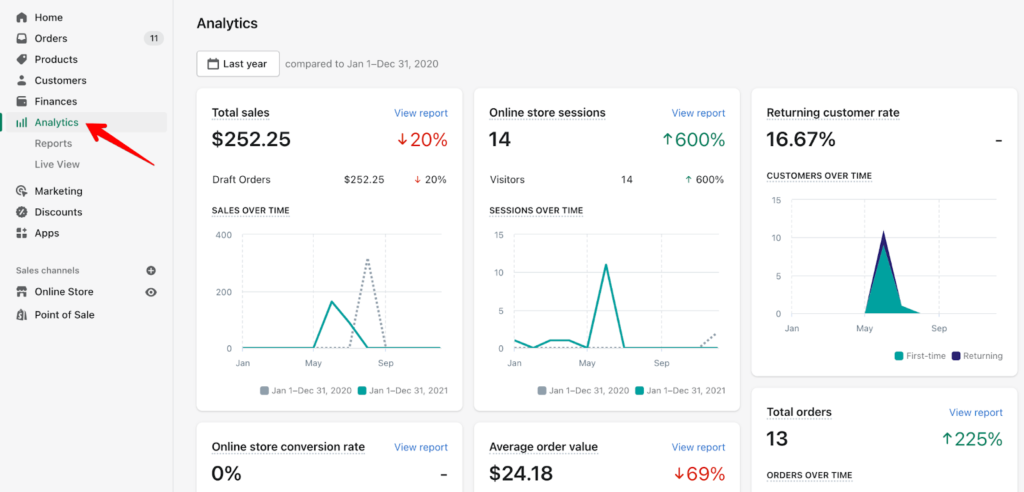
For larger businesses or those with high-volume sales, Shopify Plus offers an enterprise-level e-commerce platform with advanced features and customization options. It’s crafted to meet the demands of fast-growing businesses, providing them with the scalability and dedicated support needed for large-scale operations.
As we delve into the features and benefits of Shopify and Shopify Plus, we will also explore real-world success stories and case studies. These narratives will illustrate how the platform can be leveraged to achieve business growth, expand market reach, and create a compelling online shopping experience for customers.
In this introduction, we’ve set the stage for a deeper look into the world of Shopify and Shopify Plus. Whether you’re a budding entrepreneur or a seasoned business owner, this platform has the potential to revolutionize your online sales and drive your business forward. Get ready to uncover the many ways Shopify can contribute to your e-commerce success story.
| Feature Category | Shopify | Shopify Plus |
|---|---|---|
| Pricing | Starts at a lower monthly fee | Custom pricing based on requirements |
| Ease of Use | ✔️ | ✔️ |
| Themes and Customization | Limited customization without code | Advanced customization with full theme control |
| Performance | Suitable for small to medium businesses | Enhanced for high volume merchants |
| E-commerce Tools | Basic built-in features | Advanced features for enterprise businesses |
| Inventory Management | ✔️ | ✔️ (Advanced features) |
| Sales Channels | Multiple integrations available | Multiple integrations with exclusive options |
| Marketing Tools | Standard options | Advanced options with more customization |
| Transaction Fees | 2.0%, 1.0%, or 0.5% depending on the plan | 0% with Shopify Payments |
| Payment Gateways | 100+ options with additional fees | 100+ options with negotiated rates |
| Security | ✔️ | ✔️ (Enhanced features) |
| Support | 24/7 support via chat, email, and phone | Dedicated support with success program |
| API Access | Limited calls | Increased calls for higher-level integrations |
| Exclusive Features | ❌ | ✔️ (Dedicated account manager, etc.) |
| Scalability | For growing small to medium businesses | For high-growth and high-volume merchants |
| Checkout Customization | Basic customization | Fully customizable for a personalized experience |
| International Commerce | ✔️ | ✔️ (Enhanced features) |
| Reporting and Analytics | Standard reports | Detailed reports with custom analytics |
| App Integrations | Comprehensive app store | Access to exclusive apps and private app creation |
Table of Contents
Pricing and Plans Shopify vs. Shopify Plus
Understanding the cost implications of your e-commerce platform is essential, and when comparing Shopify vs. Shopify Plus, the difference in pricing and plans is one of the most significant considerations for any business.
Shopify offers a tiered pricing model that caters to businesses of all sizes. Starting with a basic plan that is well-suited for new or small businesses, Shopify provides the essential features needed to launch and run an online store. As businesses grow, they can scale up their Shopify plan to access more advanced features like professional reports and lower credit card rates.
The higher-tier plans increase in price, but they also include additional features, such as advanced report building and third-party calculated shipping rates. Shopify’s pricing is transparent, with monthly fees that increase as you move from the Basic Shopify plan to Shopify, and then to Advanced Shopify. Each jump in plan levels comes with an incremental set of features designed to support growing businesses.
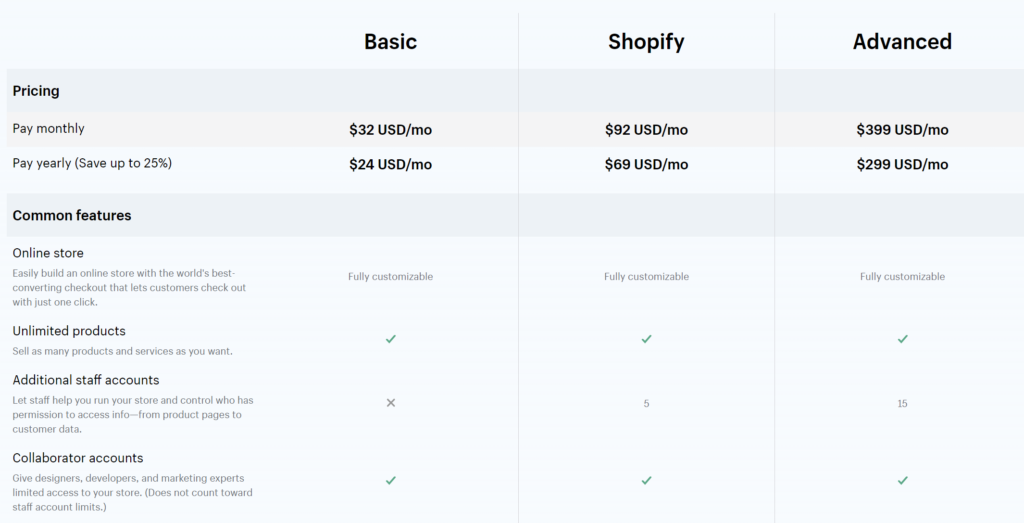
Shopify Plus is Shopify’s enterprise-level solution, offering a platform for high-volume merchants and large businesses. The pricing for Shopify Plus is significantly higher than the standard Shopify plans, reflecting the additional features, capabilities, and personalized support that come with it. Shopify Plus pricing starts at a base rate and scales up based on a variety of factors, including the volume of sales, level of customization, and integration requirements.
Shopify Plus provides an array of advanced features designed for scalability and efficiency, such as unlimited staff accounts, advanced security features, and dedicated support. The exact cost can vary greatly from one business to another because it is tailored to each company’s specific needs.

When considering Shopify vs. Shopify Plus, pricing plays a pivotal role in the decision-making process. Small to medium-sized businesses may find that the standard Shopify plans offer the right balance of features and affordability. In contrast, large businesses or those experiencing rapid growth may find the investment in Shopify Plus to be justified by the platform’s extensive features, customization options, and dedicated support designed to accommodate their expanding needs. The choice between Shopify and Shopify Plus ultimately depends on the specific requirements and budget constraints of your business.
Ease of Use
When it comes to selecting an e-commerce platform, ease of use is a critical consideration that can directly influence the day-to-day management and long-term success of your online store. In the comparison of Shopify vs. Shopify Plus, understanding how each platform caters to the user experience is key, especially for those looking to streamline their operational workflow.
Shopify stands out for its user-friendly interface, which is designed to help new merchants hit the ground running. The setup process is intuitive, allowing users to quickly launch their stores without getting bogged down in technical details. The dashboard is clean and organized, with clear navigation to different sections such as products, orders, analytics, and apps. Adding and managing products is a simple process, with fields for titles, descriptions, images, and prices laid out in a manner that’s easy to follow.
The ‘drag-and-drop’ theme editor is a highlight of Shopify’s ease of use, enabling store owners to customize their storefronts with minimal effort. Users can visually construct their pages, move elements around, and see real-time previews of their changes—no coding required.

Shopify Plus maintains the user-friendliness of Shopify but is geared towards larger businesses and enterprises with more complex operations. The platform offers additional features like advanced analytics for better decision-making and the ability to handle higher volumes of transactions and products. Shopify Plus also provides access to a dedicated support team that helps with the setup process, ongoing management, and strategic advice for growth.
While Shopify Plus is designed to be easy to use, the additional features and tools can introduce a slightly steeper learning curve. However, the presence of a dedicated support team ensures that businesses can navigate this complexity without it becoming a barrier to use.

In conclusion, both Shopify and Shopify Plus prioritize ease of use, ensuring merchants can manage their stores with confidence and efficiency. Shopify serves as the optimal choice for those who favor straightforwardness and simplicity, while Shopify Plus offers enhanced capabilities with the assurance of expert support to navigate its broader feature set.
Customization Capabilities
When it comes to tailoring your e-commerce experience, customization capabilities are paramount. Both Shopify and Shopify Plus offer a range of options to personalize your online storefront, but they cater to different levels of customization needs.
Shopify provides a solid foundation for customization, allowing merchants to select from an array of themes, both free and paid, that can be tailored to match their brand. The themes are designed to be responsive, ensuring that they look great on any device. Merchants can modify colors, fonts, and layout options directly within the theme settings, and those comfortable with code can dive into the HTML and CSS for further customization.
The platform also offers a comprehensive app store, filled with plugins that extend the functionality of your store. Whether you need to add customer reviews, improve email marketing, or provide loyalty programs, there’s likely an app for that. While Shopify’s customization capabilities are extensive for most small and medium-sized businesses, there are limitations when it comes to modifying the checkout experience, which is more standardized to ensure security and reliability.
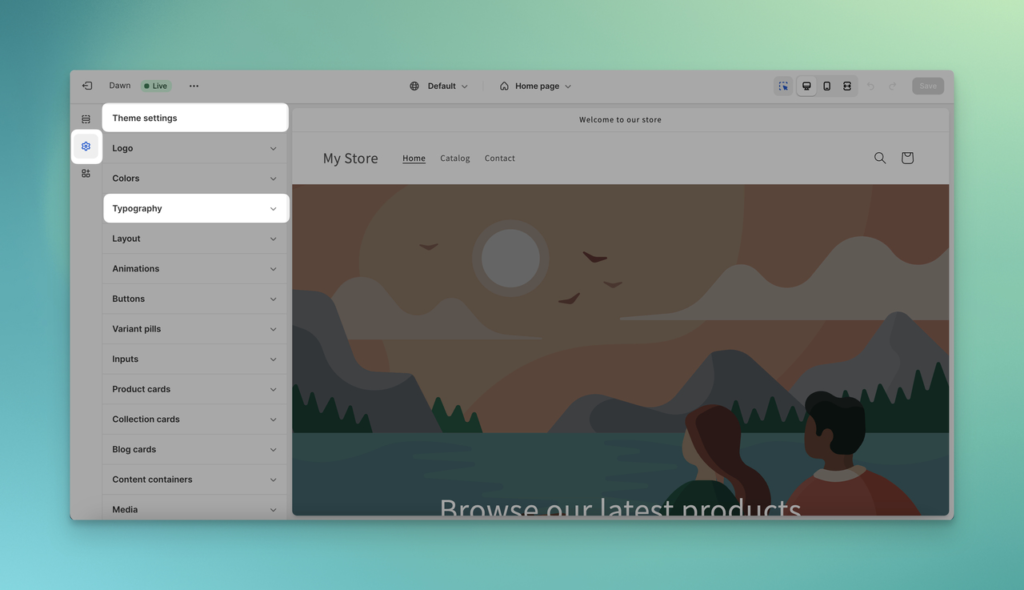
Shopify Plus takes customization to the next level by offering merchants access to a more flexible and customizable checkout experience. Plus merchants can tailor the checkout process with additional scripts that can alter the layout and function, something that regular Shopify users cannot do. This capability is crucial for businesses that require a highly tailored shopping experience for their customers.

In summary, Shopify’s customization capabilities can accommodate the majority of small to medium-sized businesses looking to establish and grow their online presence. For enterprises and rapidly scaling companies, Shopify Plus offers a superior level of customization that can be pivotal in delivering a unique brand experience and streamlining complex processes. The ability to customize your online store plays a crucial role in shaping the customer journey and can significantly impact the success of your e-commerce venture.
Performance and Scalability
In the digital marketplace, performance and scalability are key indicators of an e-commerce platform’s ability to support a business’s growth. Both Shopify and Shopify Plus offer robust solutions in this regard, but they are tailored to different scales of operation.
Shopify is known for its strong performance, providing a reliable hosting environment that ensures fast loading times and minimal downtime. This is crucial for small to medium-sized businesses that need to establish trust with customers through a seamless shopping experience. Shopify handles all the technical aspects of hosting, including server maintenance, upgrades, and security, which allows merchants to focus on their business without worrying about website performance.
As for scalability, Shopify is designed to grow with your business. It can easily handle increases in traffic and sales, ensuring that your online store remains stable during peak periods, such as holiday sales or product launches. However, businesses expecting rapid or significant growth may find some limitations with the standard Shopify plans as their needs evolve.

Shopify Plus is engineered specifically for high-volume merchants and offers superior performance and scalability. It provides advanced infrastructure to handle large spikes in traffic and transactions without sacrificing speed or uptime. With Shopify Plus, businesses have the reassurance that their platform can scale up during high-demand periods, such as major sales events or product drops, without any performance hitches.
Moreover, Shopify Plus users benefit from additional technical support and dedicated account managers who can assist with optimizing store performance and managing scalability. This level of support is invaluable for large businesses that require immediate assistance to address any issues that could impact customer experience or sales.

In conclusion, both Shopify and Shopify Plus offer dependable performance and the ability to scale alongside your business. Shopify provides a solid foundation for small to medium-sized businesses, ensuring they have the performance they need without a significant investment in technical resources. For larger businesses or those with rapid growth, Shopify Plus offers an enterprise-level solution that guarantees the platform will keep pace with their expanding requirements, offering additional resources and support to ensure smooth scaling. Choosing between Shopify and Shopify Plus for performance and scalability will largely depend on the size of your business and its growth trajectory.
E-commerce Features and Tools
The suite of e-commerce features and tools provided by a platform can be the deciding factor for merchants when choosing where to build their online store. Shopify and Shopify Plus both offer a wide array of functionalities tailored to meet different business needs.
Shopify is renowned for its comprehensive set of e-commerce features and tools that enable small to medium-sized businesses to create, manage, and grow their online stores efficiently. Key features include an easy-to-use product management system, versatile payment gateway integrations, SEO and marketing tools, and a secure shopping cart. Additionally, Shopify’s mobile app allows merchants to manage their store on-the-go.
For those looking to boost their store’s functionality, Shopify’s App Store is a treasure trove of plugins and integrations. Whether you’re looking to add customer reviews, improve email campaigns, or set up subscription services, there’s likely an app that can be seamlessly integrated with your store.

Shopify Plus offers all the robust features of Shopify but with added tools and services designed for larger businesses and enterprise-level operations. These include advanced customization options for the checkout process, higher API limits for greater integration flexibility, and exclusive access to new features before they are released on Shopify.
In addition to the standard Shopify features, Shopify Plus users benefit from exclusive tools like Shopify Flow, an e-commerce automation platform that helps streamline tasks and workflows, and Launchpad, a tool for scheduling and automating sales campaigns and product releases. Plus, the platform’s increased bandwidth and dedicated support ensure that high-volume stores can operate smoothly, even during traffic surges.
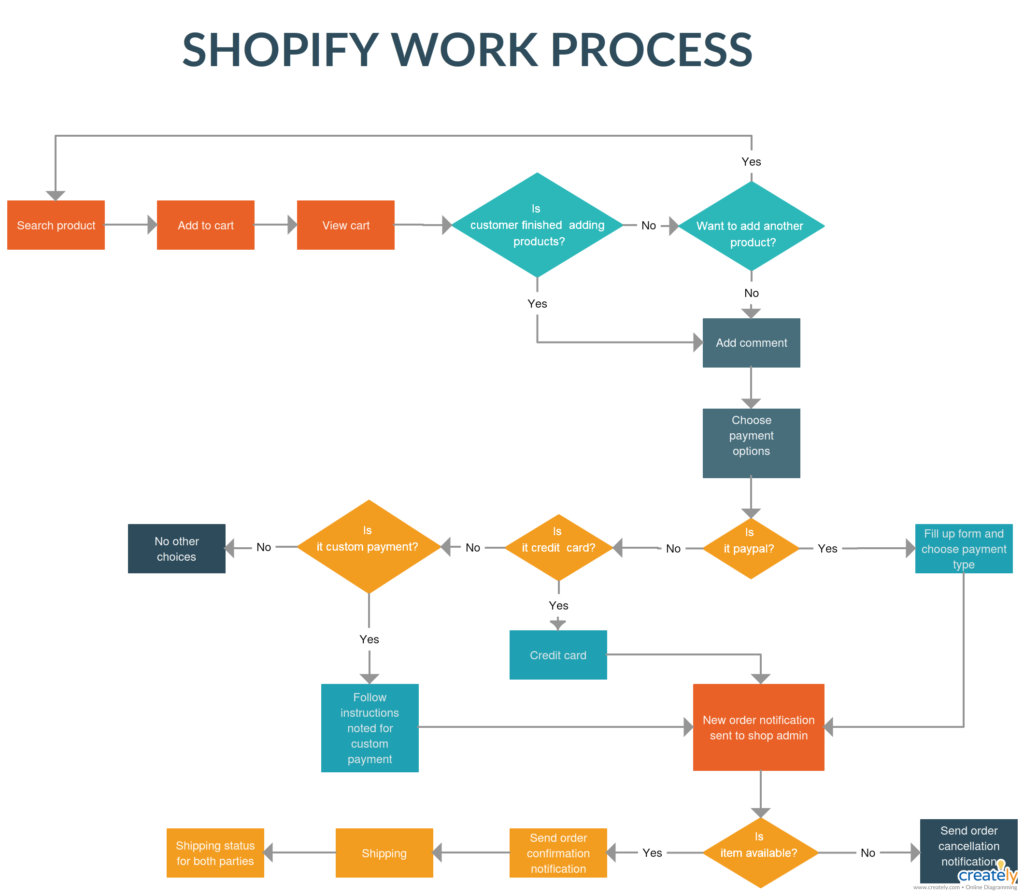
To summarize, Shopify and Shopify Plus provide a rich set of e-commerce features and tools to help businesses succeed online. While Shopify offers a broad selection of out-of-the-box features suitable for most businesses, Shopify Plus takes this a step further by equipping high-growth and high-volume merchants with advanced tools and dedicated resources to meet their complex needs. The decision between the two will depend on the size of your business, your growth aspirations, and the level of customization and automation you require from your e-commerce platform.
Inventory Management
Effective inventory management is essential for running a successful e-commerce business. It ensures that you have the right products in the right quantity, avoids excess stock, and can help to improve your bottom line. Shopify and Shopify Plus both offer powerful inventory management features that help businesses streamline their operations.
Shopify provides a user-friendly interface for managing inventory. Within the platform, you can easily add products, set up variants, and track stock levels. Each product can be associated with a unique SKU, and inventory levels can be adjusted manually or automatically updated when a sale is made. Shopify’s inventory system is well-suited for small to medium-sized businesses that need straightforward inventory tracking and management.
For businesses that require more advanced tools, Shopify’s App Store includes various inventory management apps that can integrate with the platform, offering more detailed features such as demand forecasting, multi-location stock management, and advanced reporting.
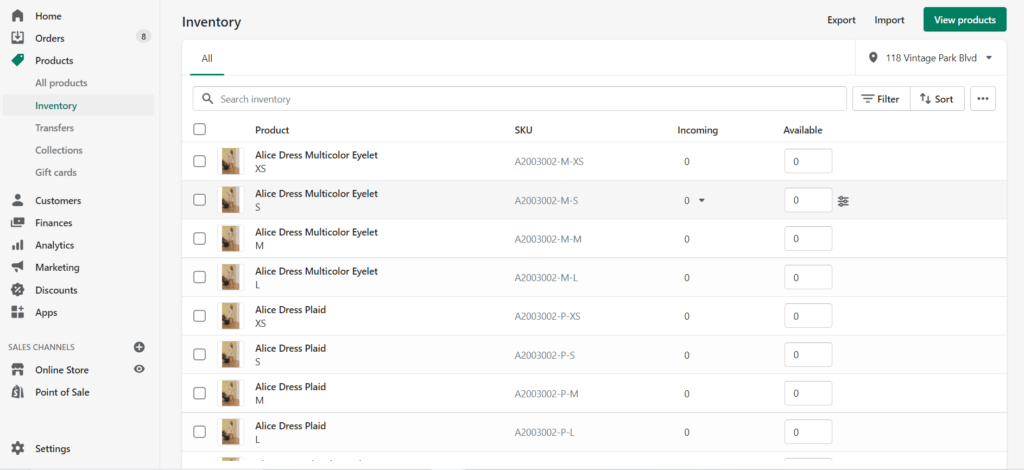
Shopify Plus builds upon the foundation set by Shopify with more robust inventory management features designed for larger operations. Shopify Plus merchants often manage higher volumes of products and orders, so the platform provides enhanced tools to handle these complexities. Plus users have access to additional API calls, which allows for better integration with third-party logistics and inventory management systems, essential for enterprise-level businesses with extensive inventory needs.
Shopify Plus also supports advanced features like smart inventory allocation, which helps businesses prioritize inventory across multiple channels and locations. This ensures the right stock is available where and when it’s needed, helping to optimize sales and customer satisfaction.
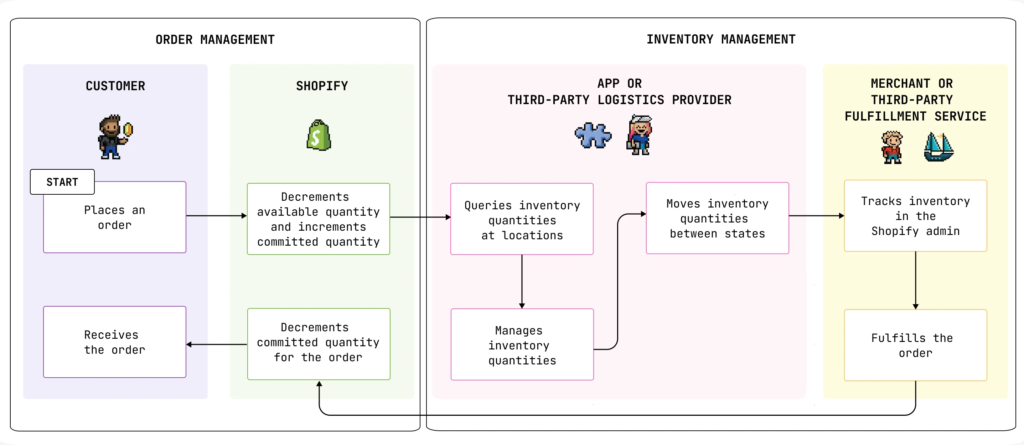
In conclusion, both Shopify and Shopify Plus offer solid inventory management solutions. Shopify’s system is sufficient for most small to medium-sized businesses, with the flexibility to expand functionality through apps. Shopify Plus provides more advanced capabilities necessary for high-volume merchants, including better integration options and tools to manage large and complex inventories. The choice between Shopify and Shopify Plus for inventory management will largely be influenced by the scale of your inventory and the specific needs of your e-commerce operation.
Sales and Marketing Tools
Sales and marketing tools are essential for attracting customers, converting sales, and encouraging repeat business. Both Shopify and Shopify Plus offer a suite of tools to help merchants reach their target audience and maximize their revenue potential.
Shopify equips merchants with a range of sales and marketing tools that are easy to use and integrate. These tools include:
- SEO features: Shopify helps optimize your store for search engines, offering customizable H1, title, and meta tags, as well as automatically generated sitemaps.
- Email marketing: With Shopify Email, merchants can create email campaigns directly within the Shopify platform.
- Discounts and coupons: Merchants can create discount codes and run promotional campaigns to drive sales.
- Social media integration: Easily link your store with social media platforms to reach a wider audience.
- Analytics: Track the success of sales and marketing efforts with built-in analytics and reporting tools.
For additional functionality, the Shopify App Store offers a plethora of third-party sales and marketing apps, covering everything from referral programs to retargeting ads.
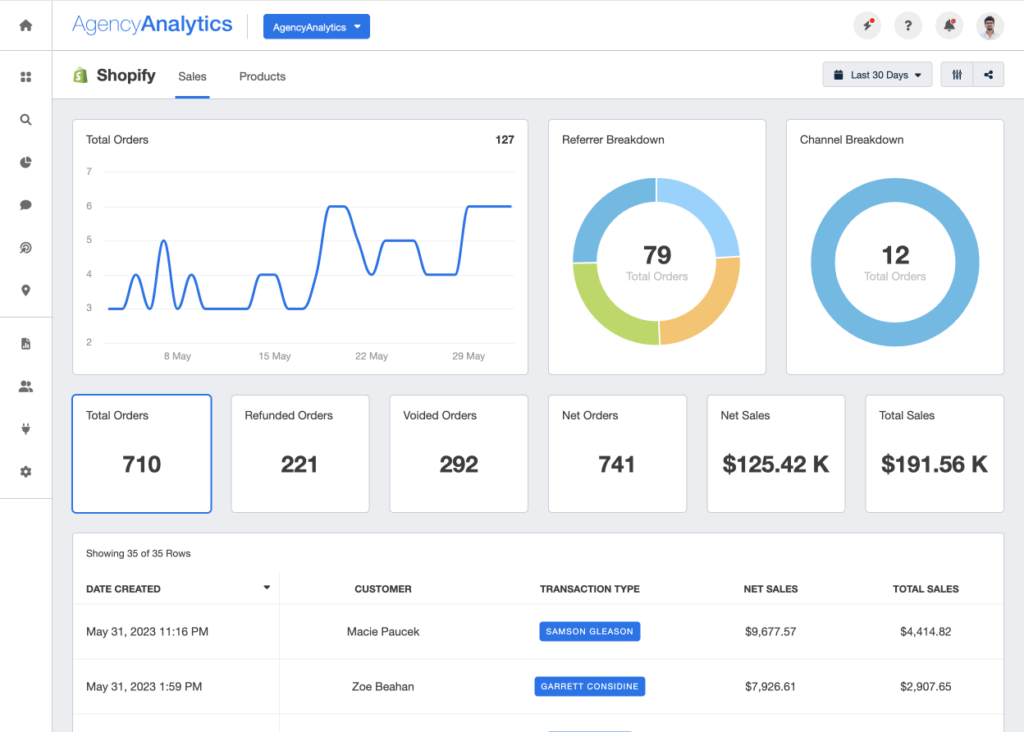
Shopify Plus takes sales and marketing tools a step further, catering to the needs of high-volume merchants with additional features like:
- Advanced customization: Tailor marketing campaigns with more granularity using Shopify Scripts and custom storefront tools.
- Wholesale channel: Create a separate, password-protected storefront for wholesale customers.
- International commerce: Tools to customize your store for global sales, including localized currency and language support.
- Exclusive apps: Access to Shopify Plus partner apps designed for enterprise-level marketing strategies.
Shopify Plus also offers dedicated support from the Merchant Success Program, helping you to optimize your marketing campaigns and sales strategies.
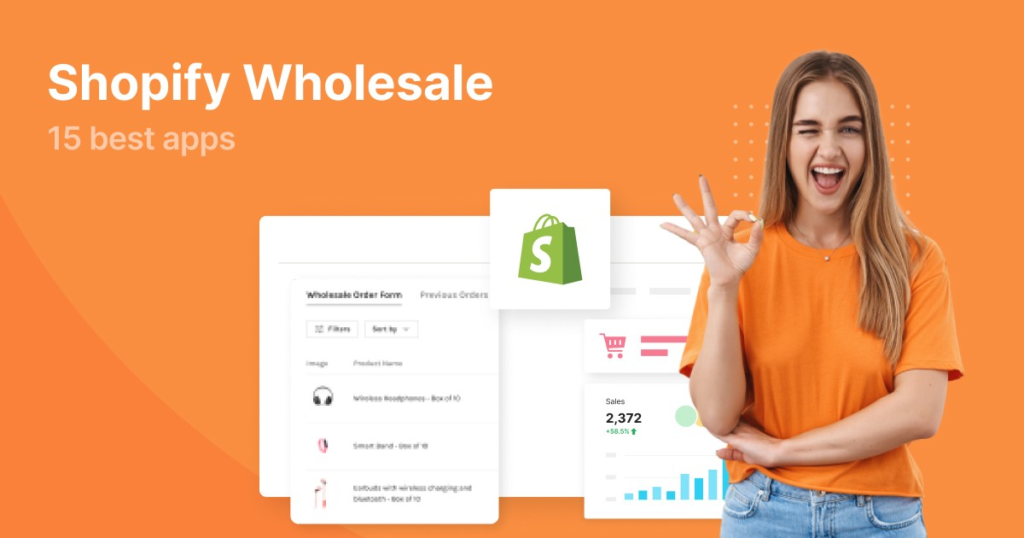
In summary, both Shopify and Shopify Plus come with a comprehensive set of sales and marketing tools that can scale with your business. Shopify provides the essentials that can work well for small to medium-sized businesses, while Shopify Plus offers a more advanced toolkit for high-volume merchants with complex marketing needs. The choice between the two will depend on your business size, volume of sales, and the sophistication required for your sales and marketing strategies.
Payment Processing and Transaction Fees
An efficient payment processing system is vital for e-commerce success, as it directly impacts the checkout experience and, consequently, conversion rates. Transaction fees are also a critical consideration, as they affect the overall profitability of each sale. Shopify and Shopify Plus offer integrated payment solutions with varying transaction fee structures to accommodate businesses of different sizes.
Shopify offers its own payment processor, Shopify Payments, which is designed to seamlessly integrate with your online store. By using Shopify Payments, merchants can accept a wide variety of payment methods, including credit cards, debit cards, and alternative payments like Apple Pay and Google Pay. One of the significant advantages of using Shopify Payments is that it waives Shopify’s transaction fees, which are otherwise applied to each sale made through alternative payment gateways.
The transaction fees for Shopify vary depending on the plan you choose. Higher-tier plans enjoy lower transaction fees, which can result in significant savings as your sales volume grows. It’s important for merchants to consider their average sales volume and choose a plan that balances monthly fees with transaction costs.
| Basic | Shopify | Advanced | |
|---|---|---|---|
| Pricing | |||
| Pay monthly | $32 USD/mo | $92 USD/mo | $399 USD/mo |
| Pay yearly (Save up to 25%) | $24 USD/mo | $69 USD/mo | $299 USD/mo |
| Transaction fees | 2% | 1% | 0.5% |
Shopify Plus caters to high-volume merchants and, as such, offers more favorable transaction fee rates. With Shopify Plus, transaction fees are negotiable based on your business’s volume and specific needs, which can lead to substantial cost savings at scale. Shopify Plus merchants using Shopify Payments will also benefit from the waiving of standard transaction fees.
In addition to competitive transaction fees, Shopify Plus provides access to a lower credit card rate, which decreases the cost per transaction on credit card payments. This is particularly beneficial for businesses with a high number of transactions.
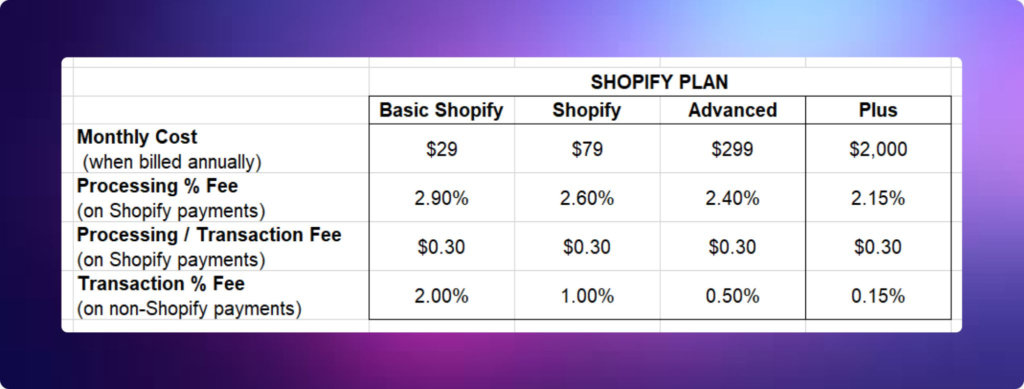
In conclusion, both Shopify and Shopify Plus offer solid payment processing solutions with different transaction fee structures to suit various business sizes and sales volumes. Shopify is ideal for small to medium-sized businesses looking for an all-in-one payment solution with a straightforward fee structure. In contrast, Shopify Plus is tailored to larger businesses seeking to minimize transaction costs on a larger scale. Selecting the right platform will depend on your transaction volumes and how the fees impact your overall profitability.
Security and Compliance
In the digital age, e-commerce security and compliance are paramount. Customers and businesses alike need assurance that their data is protected and that the platform they use adheres to international security standards. Shopify and Shopify Plus offer robust security features and compliance protocols to ensure that online stores are secure and trustworthy.
Shopify has built a reputation for providing a secure platform for e-commerce businesses. It includes SSL encryption to protect data and transactions, ensuring that all data passed between web servers and browsers remain private. Furthermore, Shopify is PCI DSS compliant, meaning it meets the standards for security policies, technologies, and ongoing processes that protect payment systems from breaches and theft of cardholder data.
In addition to these security measures, Shopify offers:
- Fraud analysis: Tools to identify and flag potentially fraudulent transactions.
- Regular updates: Continuous updates to the platform to stay ahead of potential security threats.
- Backups: Automatic backups to safeguard store data.

Shopify Plus builds on the security features of Shopify, offering the same level of encryption and PCI DSS compliance but with additional resources tailored for larger operations. This includes:
- Advanced fraud detection: Enhanced tools for fraud analysis and prevention.
- Dedicated SSL certificates: Option for dedicated SSL certificates for custom storefronts.
- Uptime guarantees: Shopify Plus provides guarantees for server uptime, ensuring that high-volume stores remain operational, especially during peak traffic periods.
Shopify Plus also offers a more tailored approach to security with individualized support to help large businesses understand and implement their own compliance measures, such as GDPR for European customers.
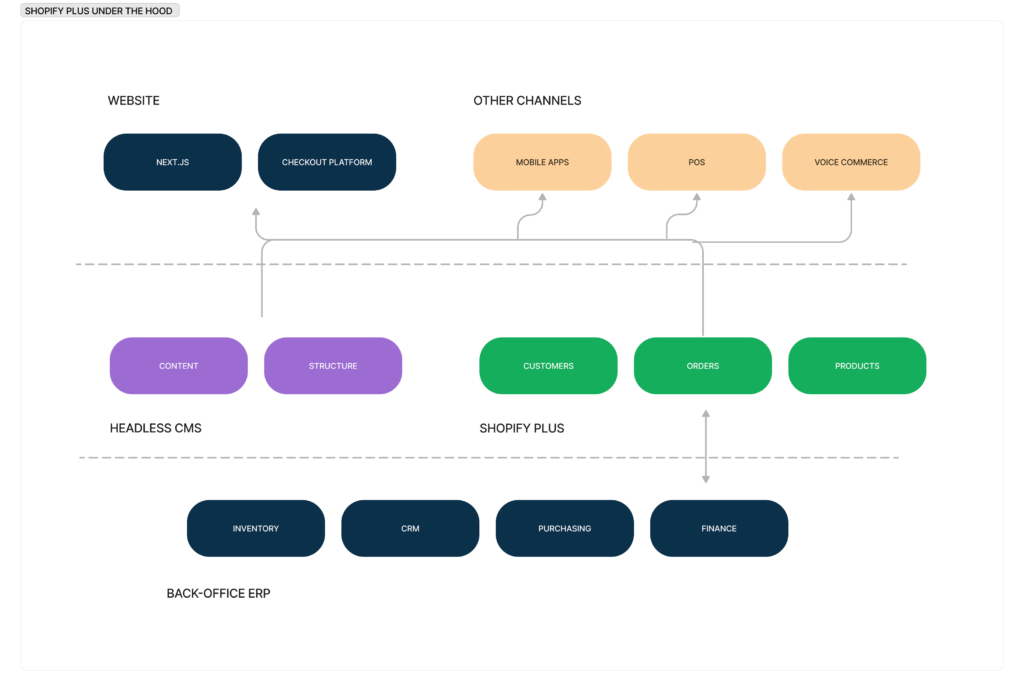
In summary, security and compliance are cornerstones of the Shopify experience, regardless of whether you are on Shopify or Shopify Plus. Both platforms provide strong security foundations with SSL encryption and PCI DSS compliance. Shopify is well-suited for small to medium-sized businesses requiring a secure, out-of-the-box solution, while Shopify Plus offers enhanced security features and personalized support for large businesses with more complex needs. Choosing between them will depend on your business’s size and the level of security and compliance support you require.
Support and Resources
Reliable support and comprehensive resources are critical for the smooth operation and growth of any e-commerce platform. Shopify and Shopify Plus offer a range of support options and educational resources to help merchants navigate the challenges of running an online store.
Shopify provides a variety of support channels to its users:
- 24/7 Support: Shopify offers round-the-clock assistance through live chat, email, and phone, ensuring that help is available whenever you need it.
- Help Center: An extensive library of articles and guides is available to help you with everything from setting up your store to troubleshooting issues.
- Community Forums: Engage with other Shopify users to share experiences, ask questions, and receive peer-to-peer advice.
- Webinars and Training: Regularly scheduled webinars and training sessions help merchants use Shopify effectively and maximize their store’s potential.

Shopify Plus offers the same foundational support as Shopify but adds premium support services tailored to high-volume merchants:
- Dedicated Support: Shopify Plus merchants receive dedicated support from the Merchant Success Program, which provides guidance on best practices and strategic growth.
- Launch Engineers: A team of launch engineers is available to help with the setup and migration of your store to Shopify Plus.
- Exclusive Resource Access: Access to Plus-specific resources, including detailed guides, best practice documents, and industry reports.
In addition to the direct support, Shopify Plus merchants also benefit from a dedicated community of high-growth and high-volume businesses, offering unique networking opportunities and shared learning.

In conclusion, both Shopify and Shopify Plus are committed to providing robust support and a wealth of resources to their merchants. Shopify’s support is comprehensive and sufficient for the majority of small to medium-sized businesses, with a strong focus on self-help resources and community-based assistance. Shopify Plus takes this a step further, offering personalized support and resources designed for the needs of larger businesses and enterprises. Your decision between Shopify and Shopify Plus in terms of support and resources will depend on the level of personalization and direct attention your business requires.
API Access and Third-party Integrations
For businesses looking to extend the functionality of their e-commerce platform, API access and third-party integrations are essential. Both Shopify and Shopify Plus provide robust APIs and support a wide range of integrations with third-party applications to enhance and customize your online store.
Shopify offers various APIs for different purposes:
- Admin API: Allows you to manage all aspects of your store, including products, customers, orders, and more.
- Storefront API: Designed for building custom storefronts, this API gives you full creative control over how your products are displayed.
- Plus-exclusive APIs: Shopify Plus provides additional API calls, which can be crucial for larger stores with more extensive data synchronization needs.
Shopify’s App Store is also a key feature, housing a myriad of third-party applications that can be easily integrated to add new features to your store, such as marketing tools, inventory management, customer service, and more.
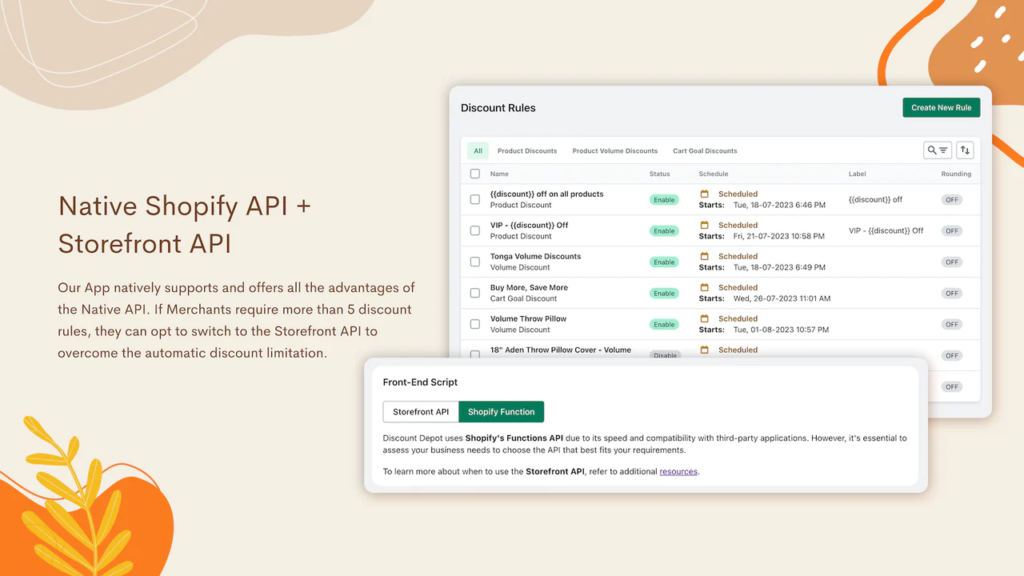
Shopify Plus enhances the API experience by offering higher API call limits. This means that high-volume businesses can push and pull data from Shopify at a much higher rate, which is vital for operations that require real-time updates across complex systems.
Shopify Plus also offers exclusive access to:
- Custom Checkout API: Allows for a fully customized checkout experience.
- GiftCard, User, and Multipass APIs: Specialized APIs for gift card management, user privileges, and single sign-on capabilities across multiple platforms respectively.
Furthermore, Shopify Plus can integrate with enterprise-level third-party solutions, providing the scalability and flexibility needed for large businesses.

In summary, API access and third-party integrations are integral components of Shopify and Shopify Plus, enabling merchants to build a tailored e-commerce environment. Shopify’s robust APIs and extensive app marketplace cater well to the needs of small to medium-sized businesses, while Shopify Plus offers advanced API capabilities for high-volume merchants who require more extensive customization and integration. When choosing between the two, consider the scale of your operation and the level of customization you need to seamlessly integrate all aspects of your business.
Shopify Plus Exclusive Features
Shopify Plus is the enterprise-level offering from Shopify, designed to cater to high-volume merchants and large-scale e-commerce businesses. It provides all the features available on Shopify, along with a host of exclusive features that support scalability, greater control, and advanced customization. Below we outline some of the key Shopify Plus exclusive features that distinguish it from the standard Shopify offering.
Advanced Customization with Shopify Scripts: Shopify Plus allows merchants to use Shopify Scripts, a feature that lets you write your own custom code on the Shopify server. This can be used to customize the checkout experience, apply automatic discounts, and modify payment and shipping options.

Higher API Call Limits: Shopify Plus merchants enjoy higher API call limits, which facilitates better integration with large databases and third-party apps. This is essential for businesses that need to handle vast amounts of data in real-time.
Exclusive Access to Shopify’s Wholesale Channel: This feature allows you to create a separate, password-protected wholesale store. It’s an invaluable tool for B2B sales, allowing for volume-based pricing, bulk ordering, and a customized wholesale experience.
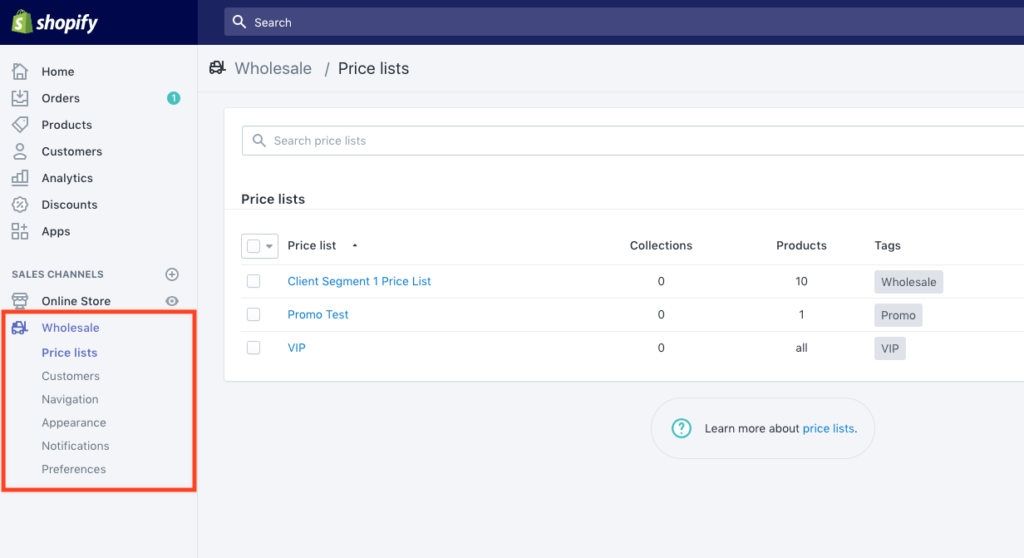
Dedicated Launch and Merchant Success Managers: Shopify Plus provides each merchant with a dedicated Launch Manager to ensure a smooth migration and launch. Once live, a Merchant Success Manager helps optimize the store and provides strategic guidance.
Enhanced Security Features: With Shopify Plus, you get additional security features such as more frequent backups and advanced fraud detection tools, ensuring that your store and customers’ data are well-protected.
Access to Exclusive Apps: Shopify Plus gives you access to a suite of apps designed exclusively for high-growth merchants. These apps focus on enterprise-level reporting, automation, and campaign management.

Unlimited Staff Accounts: Unlike Shopify, which limits the number of staff accounts based on the plan, Shopify Plus offers unlimited staff accounts, which is essential for larger teams.
Shopify Flow: An e-commerce automation platform that helps you automate tasks and processes, freeing up time to focus on growing your business.

In conclusion, Shopify Plus offers a range of exclusive features designed for high-volume businesses that require advanced capabilities. These features enable greater customization, improved efficiency, and a high level of service that can accommodate the complex needs of enterprise-level merchants. When considering Shopify Plus, it’s these exclusive features that often justify the investment for growing businesses looking to scale their operations seamlessly.
Success Stories and Case Studies
Success stories and case studies are powerful testimonials that illustrate how businesses have achieved significant milestones and overcome challenges using a particular service or platform. For Shopify and Shopify Plus, these narratives showcase the platform’s versatility and the potential for growth and success that it offers to merchants of all sizes.
Transforming Businesses with Shopify and Shopify Plus
Small Business Growth: Many small businesses have seen remarkable growth after launching on Shopify. These success stories often highlight the platform’s user-friendly nature, which allows even those with little to no technical expertise to establish an online presence and reach a wider market.

Scaling to New Heights with Shopify Plus: Shopify Plus success stories usually focus on larger enterprises that require a robust platform to handle increased volume and demand. These case studies reflect on the scalability of Shopify Plus, detailing how the platform supported business expansion and improved operational efficiency.
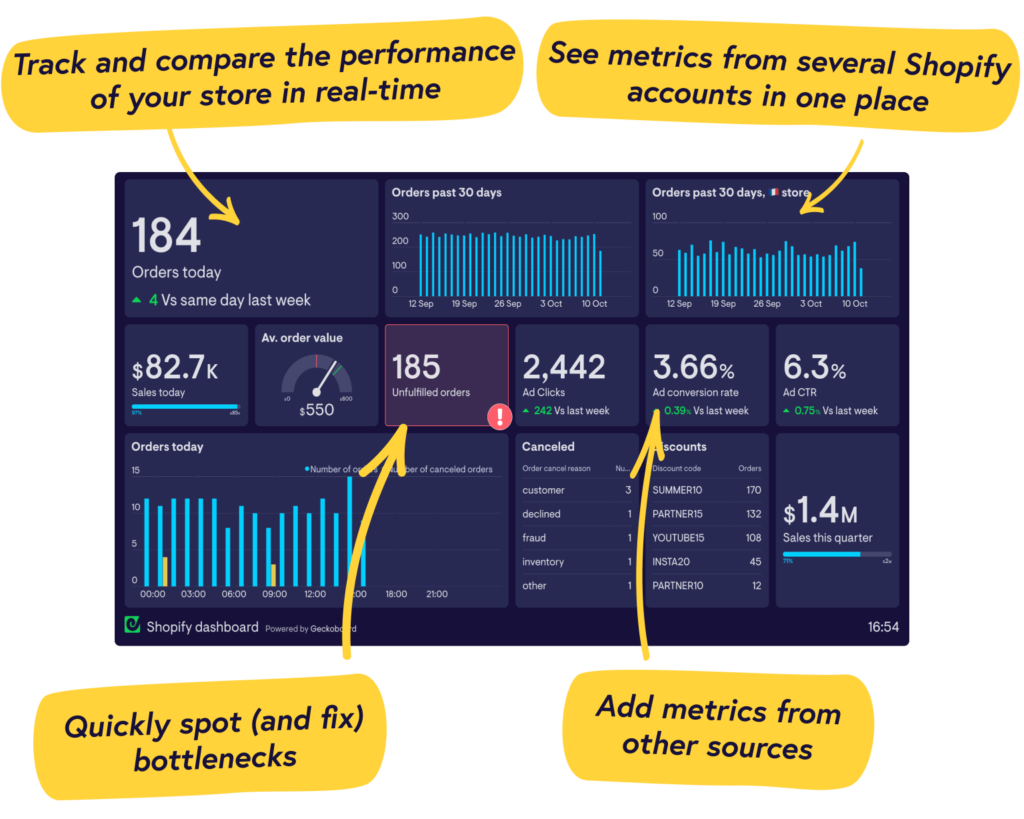
Diverse Industry Success
Shopify and Shopify Plus cater to a vast array of industries, from fashion and beauty to electronics and home goods. Success stories often emphasize the platform’s flexibility and the ability to tailor the e-commerce experience to the specific needs of various market segments.
Niche Markets: Case studies from niche markets demonstrate how businesses can leverage Shopify’s features to cater to a specific audience. These stories resonate with the adaptability and customization capabilities of the platform.

Global Expansion
With Shopify’s global reach, case studies frequently discuss how merchants have taken their local businesses to an international audience. Success stories from Shopify users often include their experiences with cross-border commerce, currency conversion, and international shipping.

Innovative Use Cases
Shopify and Shopify Plus are not only about selling physical products; they also serve service-based businesses, digital products, and membership-oriented models. Innovative use cases highlight how different business models can thrive on Shopify.
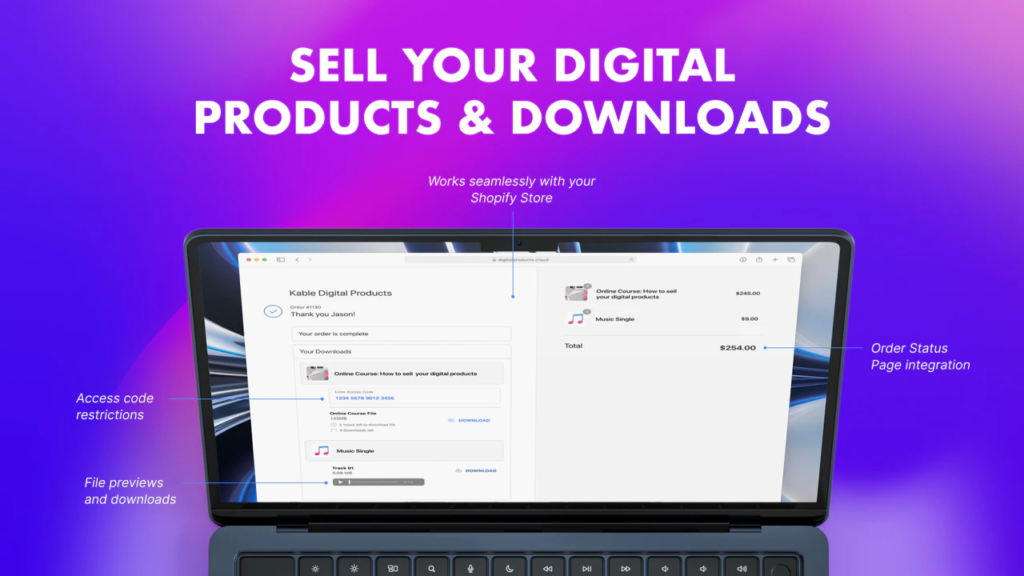
In summary, success stories and case studies are integral to understanding the real-world applications and benefits of Shopify and Shopify Plus. They provide insight into the platform’s ability to facilitate growth, manage scale, and adapt to various business needs. Visual elements such as growth charts, global reach maps, and snapshots of unique storefronts enhance the narrative by providing tangible evidence of success. These stories serve as inspiration and validation for potential and current merchants aiming to carve out their own success stories on the platform.
Conclusion
In the landscape of digital commerce, the importance of choosing the right e-commerce platform cannot be overstated. Shopify and Shopify Plus stand out as comprehensive solutions that cater to a range of businesses, from small startups to large enterprises. The success stories and case studies from various industries serve as a testament to the platform’s flexibility, scalability, and user-friendly nature.
Whether you are just starting out or are looking to migrate to a platform that can handle increased traffic and sales volume, Shopify offers the tools and features necessary to support your business’s growth. Shopify Plus takes this a step further, offering exclusive features tailored to the needs of high-volume merchants who demand advanced customization and dedicated support.
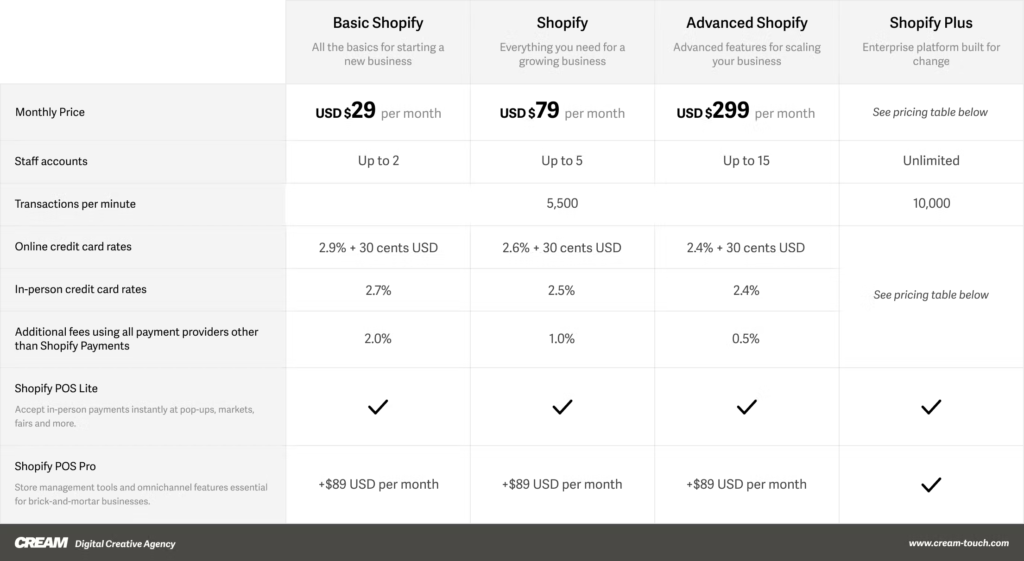
Remember, the choice of your e-commerce platform can have a lasting impact on the future of your business. It’s not just about selling products or services; it’s about creating a seamless, efficient, and enjoyable shopping experience for your customers, while also managing your business effectively.
As we conclude, it’s clear that Shopify and Shopify Plus have played pivotal roles in the success stories of many businesses. The platform’s continual evolution, commitment to user experience, and robust support ecosystem make it a formidable choice for anyone looking to start or grow their online store.
Whether you are inspired by the success stories, motivated by the case studies, or simply looking for a platform that can meet your business needs, Shopify and Shopify Plus offer a pathway to achieving your goals. Embrace the journey, and you may well find your own success story among those celebrated by Shopify’s diverse and thriving merchant community.

